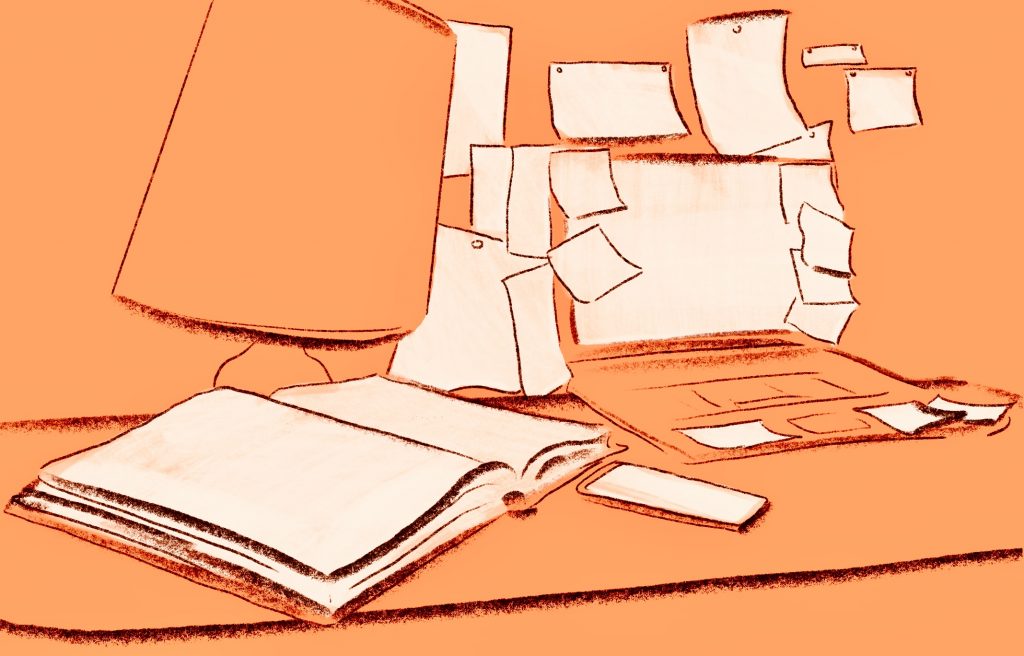It’s no secret that students are struggling with online learning. It’s easy to feel disconnected and unfocused when it comes to sitting through lectures on Zoom week after week, and pairing these struggles with the typical obstacles of any semester makes for a problem for both students and professors.
Harpur College of Arts and Sciences has reported a rapid rise in plagiarism, with both major and minor infractions nearly doubling. The rest of the colleges at Binghamton University have yet to report their recent statistics, but it’s safe to assume that this trend isn’t isolated to Harpur College. The Harpur College Academic Honesty Policy divides offenses into “Category I,” which includes direct plagiarism, working with other students when not allowed and cheating, while “Category II” covers bribery, forgery and more severe instances of Category I offenses. This comes from a fairly even mix of both reporting directly from professors witnessing infractions as well as plagiarism-detecting software, such as Turnitin.
The cause of this rise in plagiarism among students is pretty obvious — the struggles of online learning, coupled with increasingly stressful environments and, of course, access to the internet during all hours of class time. Not to mention, the days where a professor can stand over your shoulder to catch you copying off a classmate are gone. Some students have gotten used to writing answers on arms, passing around notes and whispering to a nearby friend, but videos and threads on how to best cheat for online exams have even gone viral on social media.
While cheating and plagiarism are issues viewed as somewhat inevitable, even during a typical semester, some professors may be looking for the best way to approach this situation while still being understanding of students’ circumstances. Attempts to combat this rise in infractions may include taking steps like making more quizzes or exams open-book or open-notes, extending deadlines until the end of the semester or by easing up on grading scales to lessen the strain on students. This grade inflation as a result of certain classes becoming easier accounts for a general GPA inflation seen not only in Harpur College, but for example, in the athletics department as well. Last fall, the average GPA of a BU athlete has jumped from 3.29 to 3.43.
On the opposite end of things, other professors may be cracking down on plagiarism by modifying online assignments so that students can not leave their browsers or by employing test-taking software that tracks students’ monitors. While deemed necessary to prevent cheating, there are many students that view these measures of an invasion of privacy, especially for those studying in their private living spaces. There are also more immediate consequences to cheating as professors may even withhold recommendation letters, an essential component to graduate school and even job applications, if they catch students breaking academic honesty policies.
Those professors attempting to find a middle ground may be changing the actual formats of their exams by asking more open-ended questions and preventing students from backtracking to a previously answered part of their exam. Some may even implement “Zoom work time,” class time reserved for students to do work while the professor is available, to lend a hand with difficult topics and ensuring that students are understanding the material. Those working hard to accommodate students while still making sure the class is actually learning something aren’t given an easy task.
It’s essential that professors are as clear as possible when laying out the guidelines for assignments and testing to ensure that there’s no misunderstanding in the classroom. Seeking out feedback from students on a consistent basis throughout the semester to address any rising concerns is also crucial. It makes sense to ask students to stay away from phones during exams, but encouraging student connections by having a running thread of up-to-date student notes available via Google Docs, or through apps like GroupMe and WhatsApp outside of class periods could help foster an essential support system early on in the semester. And no, professor, maybe it’s best if you aren’t a part of those particular chats. Encourage proactive learning and take measures to actively engage students in the Zoom classroom with activities and lively discussion. Pushing students in a healthy way and enticing them to sign on will motivate to do their assignments in real time.
To students, at risk of sounding like a professor, it’s worth noting that cheating doesn’t help you in the long run. It prevents you from fully understanding and absorbing the material. In all honesty? You’re only making things harder for yourself, for future classes and possibly your career. Recognize that being a student is much harder than it used to be, so focus on smaller consistent efforts rather than treating the work as if it’s the same. Don’t assume an open-notes approach will make an exam or quiz easier — do at least an hour or two of prep work to avoid the frantic search through your notebook. Assume your professors will be taking some of the measures listed above and plan accordingly. Be as honest with yourself as possible. If you’re a procrastinator — and we all are — don’t try to operate as if you’ll be working perfectly in sync with your class assignments. Find a loophole and start earlier so you can allow yourself more time to get the procrastination out of your system! Start a week in advance rather than a few days so that, when you catch yourself in that five-hour social media “break,” you have more leeway before your deadline. Everyone is struggling right now, there’s no need to make it harder on yourself.



